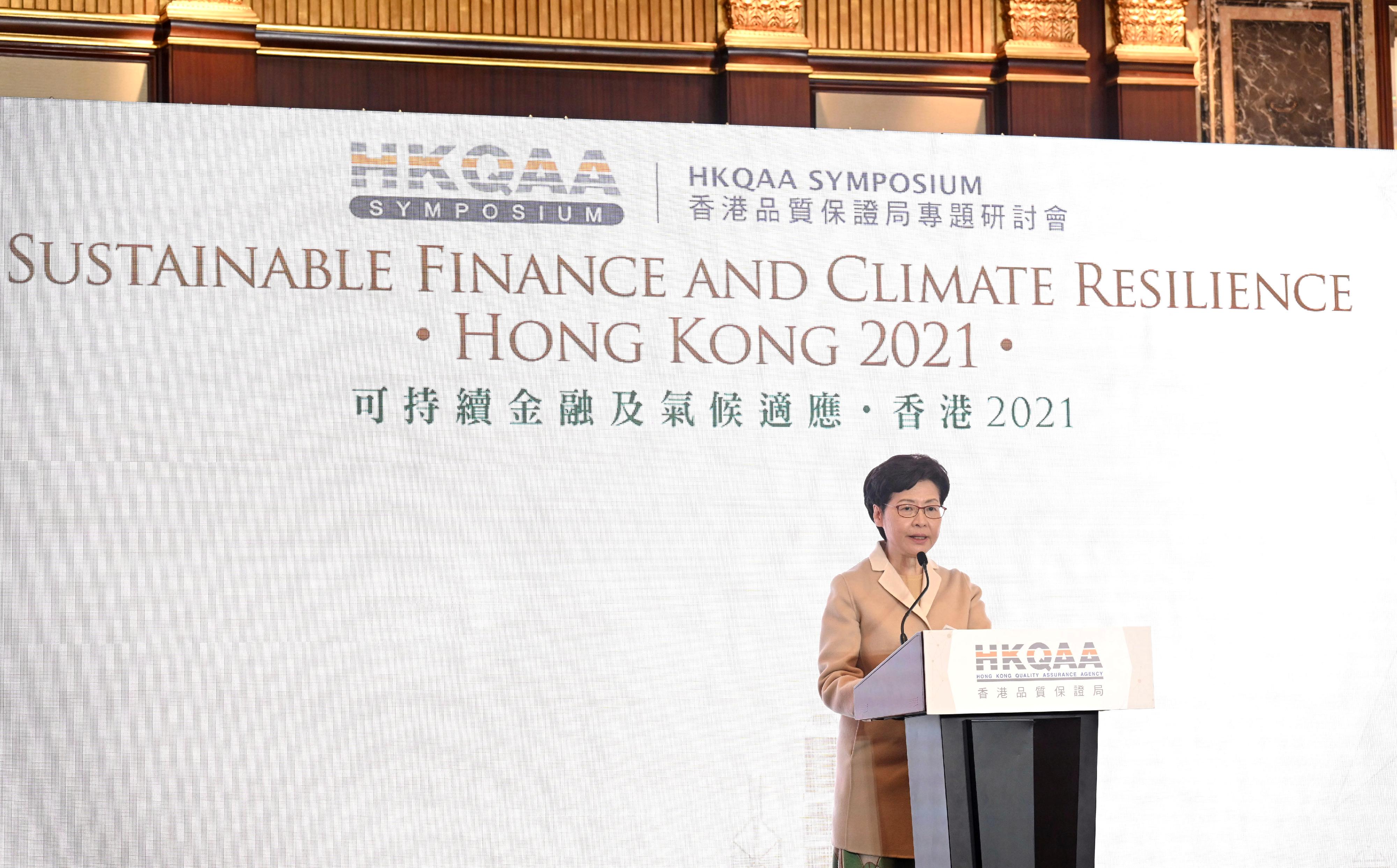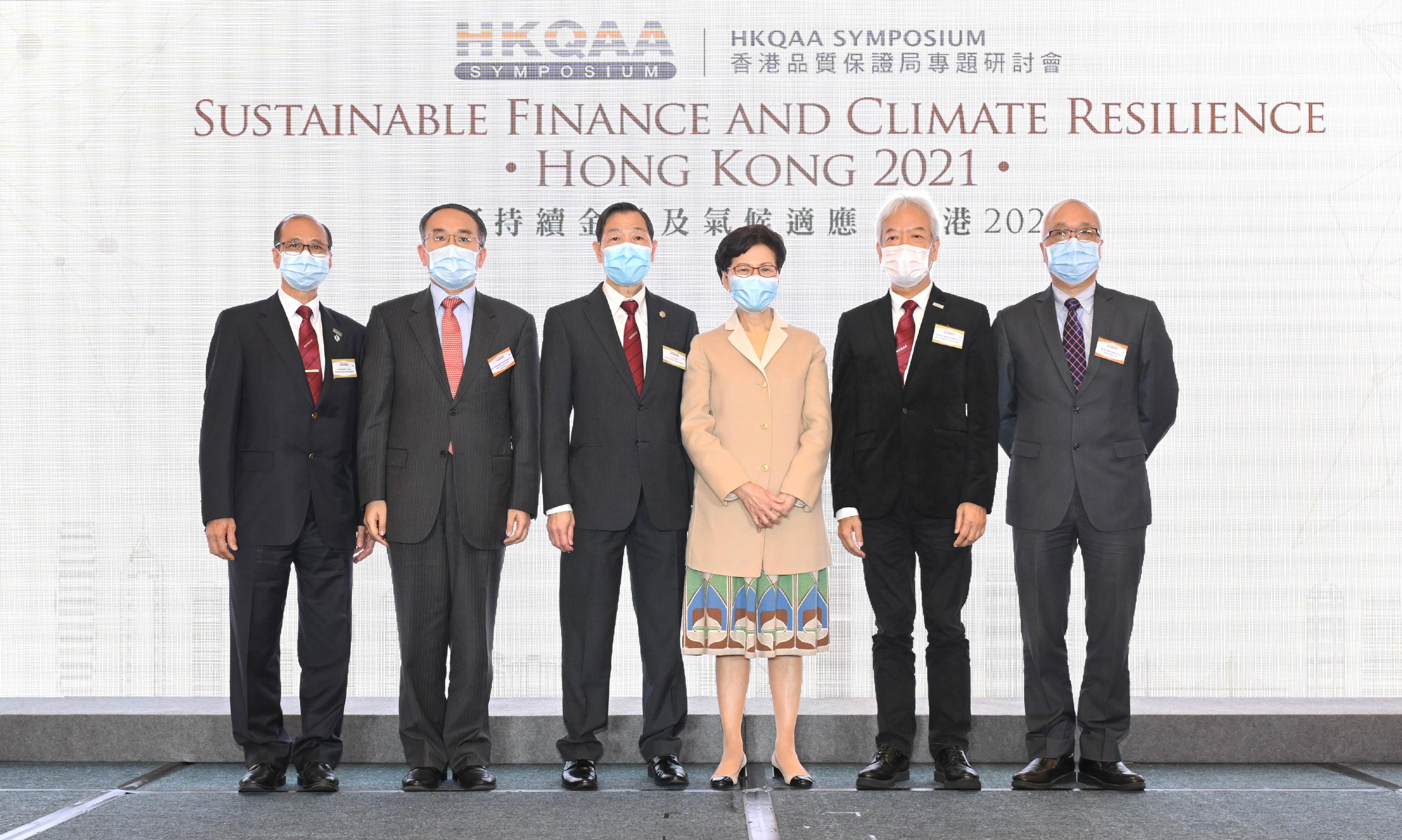Following is the speech by the Chief Executive, Mrs Carrie Lam, at the Hong Kong Quality Assurance Agency (HKQAA) Symposium – Sustainable Finance and Climate Resilience today (December 3):
Chairman Ir C S Ho (Chairman of the HKQAA, Mr Ho Chi-shing), distinguished guests, ladies and gentlemen,
Good afternoon. It is my great pleasure to attend today's symposium organised by the Hong Kong Quality Assurance Agency (HKQAA), under the theme of Sustainable Finance and Climate Resilience. Last year I actually participated in this forum through a video speech, so I am naturally glad to be able to be here in person this year, with the event being held in hybrid format amid the stable epidemic situation in Hong Kong. I am very grateful to Mr Ho for his kind words about the work done by the Hong Kong SAR Government in combating the epidemic, but I am sorry to say that you are not allowed to do everything you want to, yet – you can't remove your mask while attending this symposium, so bear with us for a while. I hope that we should be able to further improve the Hong Kong situation and also address your aspiration for some normal travel into the Mainland without being subject to quarantine very soon.
The 2021 United Nations Climate Change Conference (COP26) held last month has drawn the world's attention to the pressing need for immediate action to combat climate change. While Hong Kong is only accountable for a very small part of the world's carbon emission, we are determined to contribute to the world's efforts. I pledged in my Policy Address last year that we will reach carbon neutrality before the year 2050. This year, soon after my 2021 Policy Address, the Secretary for the Environment has published Hong Kong's Climate Action Plan 2050, under which a midterm goal of 2035 is set, at which time we hope to reduce carbon emission by 50 per cent as compared to the base year of 2005, which translates into an absolute reduction in per capita carbon emissions from 6.1 tonnes to between 2 and 3 tonnes, as compared to 4.5 tonnes in 2020. It has taken us 15 years to achieve a 26 per cent reduction in per capita emission. It would require doubling our efforts in order to reach the midterm target of 2035. The Plan also sets out proactive strategies and measures to achieve our pledged goal, covering electricity generation, energy saving and green buildings, green transport and waste reduction. We expect some HK$240 billion public sector investments in the next 15 to 20 years to support the measures, which will at the same time create many opportunities in green economy.
In my view, Hong Kong can contribute much more than reducing our city's own carbon emissions. Ranking number three in the Global Financial Centres Index and with the world's sixth largest stock market, Hong Kong is well positioned to provide the necessary financial services support and participate actively in the global transition towards a low-carbon and sustainable economy. Over the years, the Hong Kong SAR Government, together with our financial regulators, has been developing green and sustainable finance to boost investments conducive to reducing carbon emissions and building a low-carbon economy. To further enhance our position as a green and sustainable finance hub in the region, we are now doubling our efforts to promote market development, align Hong Kong's regulatory standards with international best practices, encourage more entities to make use of Hong Kong's capital markets as well as financial and professional service, and capitalise on the enormous green finance opportunities presented by the Guangdong-Hong Kong-Macao Greater Bay Area development and the Belt and Road Initiative.
And amongst those measures, the Government will take the lead where appropriate. For example, we have recently doubled the borrowing ceiling of the Government Green Bond Programme to HK$200 billion which will provide more room for piloting the issuance of green bonds that involves more types of currencies, project types, issuance formats and channels. We successfully issued the third batch of government green bonds last month, worth US$3.75 billion and comprising five tranches including euro-denominated bonds and Renminbi-denominated bonds for the first time, which were all well received by global institutional investors. We are also planning to issue retail bonds for the participation of the general public, engaging them in the development of green finance. In addition, we have enhanced the Green and Sustainable Finance Grant Scheme to encourage issuance of more green and sustainable bonds and loans in Hong Kong, and attract more financial and professional service providers and external reviewers to expand their presence in Hong Kong.
To grow the talent pool of this fast-growing market, I announced in my 2021 Policy Address to add professionals in ESG to the Talent List. In addition, we will endeavour to include more courses related to ESG in the list of reimbursable courses under the Continuing Education Fund and incorporate more ESG-related topics in the business and finance programmes. Meanwhile, the Centre for Green and Sustainable Finance is co-ordinating efforts of financial regulators, government agencies, industry stakeholders and academia in capacity building, thought leadership and policy development.
As China is striving towards achieving carbon neutrality before 2060, Hong Kong is in a unique position to connect the flow of green and sustainable funds with the Mainland and the world to promote green investments and ecological civilisation on the Mainland. For this, the Green and Sustainable Finance Cross‑Agency Steering Group formed by relevant government bureaux and financial regulators will soon complete an assessment report on the feasibility of developing Hong Kong into a regional carbon trading centre and explore opportunities presented by the carbon emission markets in the Mainland and overseas. We will also promote co-operation between the Hong Kong Exchanges and Clearing Limited and the Guangzhou Futures Exchange in areas such as clearing, technology, product development and marketing to drive the development of a green and low-carbon market in the region. But I would say that Hong Kong's ambitions in green finance go beyond the Greater Bay Area. For example, in my recent official trip to Hubei, I also visited the Hubei carbon emission exchange, and they are also very keen to co-operate with us.
HKQAA has indeed long been one of our most supportive partners in promoting green and sustainable finance. I am glad to know that HKQAA launched a new Green and Sustainable Finance Certification Scheme in May this year to cover a wider array of green and sustainable products in the market. Looking ahead, we shall continue to count on the good work of the HKQAA in quality assurance and maintenance of standards for our green and sustainable causes. We also look forward to further collaboration with the industry and stakeholders to encourage more entities, especially those in the Greater Bay Area, to make use of Hong Kong's platform for green and sustainable investment, financing and certification.
I wish the symposium a great success and all of you the best of business, investment and health. And as Christmas and New Year are approaching, I take this opportunity to wish you a happy Christmas and a more rewarding and fruitful year ahead.
Thank you very much.
Follow this news feed: East Asia







